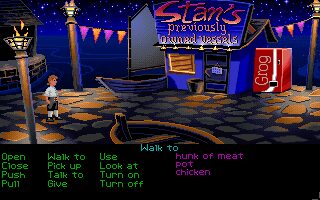Among the most influential tools in the history of computer game development, the SCUMM engine (Script Creation Utility for Maniac Mansion) holds a special place. Created in 1987 by Ron Gilbert and Aric Wilmunder at Lucasfilm Games (later LucasArts), SCUMM was originally developed to streamline the production of Maniac Mansion, a groundbreaking graphic adventure that introduced players to a new style of gameplay focused on exploration, puzzle-solving, and quirky humor. The engine allowed designers to script complex scenes, interactions, and dialogues without the need to rewrite low-level code for every new game—making development faster and more creative.
Following Maniac Mansion, SCUMM became the backbone of Lucasfilm’s legendary adventure game legacy. Titles like Zak McKracken and the Alien Mindbenders (1988) expanded on the formula with even more intricate puzzles and surreal storytelling. Then came Indiana Jones And The Last Crusade (1989), which not only faithfully adapted the iconic film but also offered multiple solutions to many puzzles—a rare and welcome innovation at the time. In 1990, Loom introduced a more poetic and musical approach to gameplay, simplifying the verb-based interface in favor of a unique spellcasting system, yet still powered by SCUMM.
Of course, no discussion of SCUMM is complete without The Secret of Monkey Island (1990), a genre-defining masterpiece that blended comedy, memorable characters, and smart puzzle design. It was followed by the beloved sequel Monkey Island 2: LeChuck's Revenge and later, the beautifully animated Day of the Tentacle (1993), which also served as a sequel to Maniac Mansion. Another standout was Sam & Max: Hit the Road (1993), which broke conventions with its wacky tone and more open-ended structure.
While primarily associated with point-and-click adventures, SCUMM wasn’t limited to them. The engine was later adapted for educational and children’s titles, including the popular Backyard Baseball series, proving its versatility and longevity. SCUMM’s user-friendly structure, combined with the storytelling genius of LucasArts, helped define a golden age of adventure gaming that still influences game designers today.













